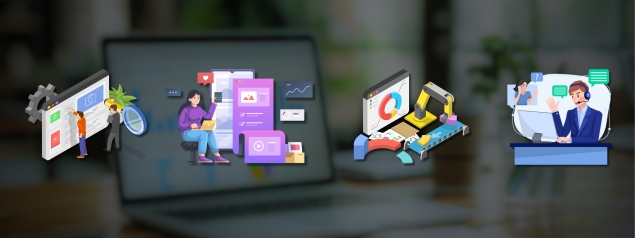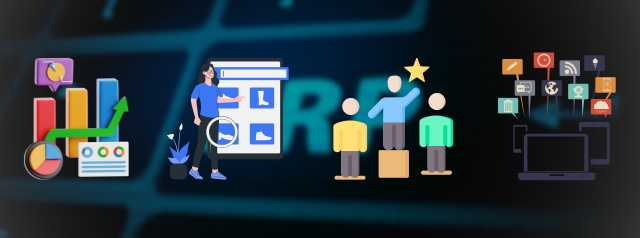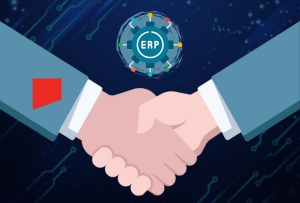With a track record of delivering impactful digital solutions, Experion builds ERP systems that streamline operations, accelerate growth, and future-proof your business.
Imagine having a tool built specifically for your business – one that doesn’t force you to change your processes but adapts to them. That’s the power of custom ERP software. More than just a system it’s the engine that drives efficiency, connects every department, and helps your business scale without limits. Unlike generic, one-size-fits-all solutions that force you into awkward workarounds, custom ERP is designed to fit your operations like a glove, solving problems before they slow you down.
So, why settle for a system that almost works when you could have one that works perfectly for you? Let’s explore why custom ERP isn’t just a choice, it’s a competitive advantage.
What is Custom ERP Software?

Custom ERP software is a fully personalized solution designed to support the specific workflows and goals of a business. Unlike pre-built ERP systems that cater to broad industries, customized ERP software is crafted to align with your unique processes, making it an ideal choice for businesses with specialized operations or complex workflows.
While off-the-shelf ERP software often requires heavy customization or third-party plugins, custom ERP software development results in a system built to fit your business from the start. It is tailored to your exact operations, which not only simplifies processes but also enhances overall efficiency. With a well-designed custom ERP software development service, you can address challenges unique to your industry and create a system that grows with your business.
Why Businesses Opt for Custom ERP Software?
Several key factors drive businesses to invest in custom ERP software development services. Unlike generic solutions, custom ERP solutions are designed to solve specific pain points and deliver targeted value. Here are the top reasons why businesses choose to go custom:
Scalability
Custom ERP software is designed with future growth in mind. As your business expands, your ERP system can scale accordingly, supporting more users, handling larger data volumes, and integrating new business units or locations. Unlike off-the-shelf software, which may require expensive upgrades or add-ons, custom ERP grows with your business, ensuring long-term value.
Flexibility
Every business evolves, and its processes change over time. Custom ERP software offers the flexibility to adapt to these changes. New modules, workflows, and features can be added without disrupting operations. This adaptability means your ERP remains relevant as your business grows, adjusts to market trends, and introduces new products or services.
Seamless Integration
A common challenge with off-the-shelf ERP solutions is compatibility with existing systems. Custom ERP software, however, is designed to integrate seamlessly with your current tools and databases. This eliminates data silos, ensuring smooth information flow across departments. Seamless integration enhances collaboration, speeds up processes, and provides a unified view of your operations.
Addressing Industry-Specific Challenges
Industries like healthcare, manufacturing, logistics, and retail often have specialized requirements. Custom ERP software can be tailored to meet these specific needs, providing features and workflows that off-the-shelf solutions cannot. Whether it is inventory management for a manufacturing company or patient records for a healthcare provider, custom ERP ensures your system works for you.
The Process of Custom ERP Software Development

Developing custom ERP software is a structured and detailed process that involves multiple stages, each ensuring that the final product meets business needs and delivers value. Here are the key steps involved:
Requirement Gathering and Analysis
This is the most critical step in custom ERP software development services, as it sets the foundation for the entire project. It involves collaborating with stakeholders to understand business processes, pain points, and goals. During this phase, detailed workflows, user roles, and system requirements are documented to ensure the ERP software is aligned with business needs.
Designing an Architecture
Once requirements are gathered, the system architecture is designed. This includes creating a blueprint for databases, user interfaces, modules, and integrations. The architecture is built to ensure scalability, security, and performance. It is the backbone of the ERP system, ensuring that all components work together seamlessly.
Development, Testing, and Deployment
The actual development phase involves coding and building the ERP system based on the approved architecture. Once developed, the software undergoes rigorous testing to identify and fix bugs, ensure security, and verify performance. After successful testing, the ERP system is deployed into the business environment, and users are trained on how to use it effectively.
Ongoing Maintenance and Support
The development process does not end with deployment. Continuous maintenance and support are essential to ensure the ERP system remains efficient and up-to-date. Regular updates, security patches, and system improvements are implemented to keep the software aligned with evolving business needs.
Key Considerations in Custom ERP Software Development
When developing a custom ERP solution, several important factors must be considered to ensure success and long-term usability. Here are the most crucial ones:
User-Friendly Interfaces
No matter how powerful the software is, it must be easy to use. Intuitive and user-friendly interfaces are critical for ensuring quick adoption by employees and reducing training time. A well-designed interface makes it easier for users to access features, manage workflows, and get the most out of the system.
Security Features
Since ERP systems handle sensitive business data, security is paramount. The system should include features like multi-level access controls, encryption, and secure authentication. Strong security protocols protect against cyber threats and ensure data privacy and integrity.
Compliance with Industry Standards
Industry standards and regulatory compliance must be built into the ERP system. Whether it is GDPR for data protection or HIPAA for healthcare, the software should ensure that all industry regulations are met. This protects the business from legal issues and enhances credibility.
Benefits of Custom ERP Software

Custom ERP software offers several advantages that off-the-shelf solutions cannot match. Here are some of the key benefits:
Enhanced Operational Efficiency
Custom ERP systems streamline workflows by automating repetitive tasks and optimizing processes. This reduces manual errors, accelerates decision-making, and improves overall productivity. The result is a smoother, more efficient operation that saves time and resources.
Tailored Functionality
Unlike generic solutions, custom ERP software is designed to address the specific needs of your business. It includes modules and features tailored to your workflows, which means every component of the system is useful and relevant to your operations. This customization increases productivity and reduces the need for third-party applications.
Competitive Advantage
A well-implemented custom ERP system can give your business a significant edge over competitors. By streamlining processes, enhancing customer service, and providing real-time insights, custom ERP helps businesses respond quickly to market changes and customer needs.
Industry-Specific Applications
Industries like manufacturing, healthcare, retail, and logistics often have unique operational needs. Custom ERP solutions can be built to address these specific challenges directly. For example, a manufacturing ERP system can include real-time inventory tracking, while a healthcare ERP can manage patient records securely.
Cost-Effectiveness and Long-Term ROI
Although custom ERP software may require a higher initial investment than off-the-shelf solutions, it often delivers better long-term value. Here is how custom ERP drives cost savings and ROI:
Reduced Operational Inefficiencies
By automating processes and streamlining workflows, custom ERP software reduces waste and minimizes costly errors. Real-time data access improves decision-making, and optimized processes save time and labor costs.
Long-Term Savings
Unlike off-the-shelf ERP solutions, which often require expensive upgrades, custom ERP systems are designed to be flexible and scalable. This adaptability reduces the need for costly replacements or add-ons as your business grows.
Reduced Licensing Costs
Many off-the-shelf ERP solutions come with high recurring licensing fees. Custom ERP software, on the other hand, often involves a one-time investment, freeing your business from recurring costs and saving money in the long run.
Custom ERP Software vs. Generic Solutions: Which One Truly Fits Your Business?
When it comes to managing your business operations, choosing between custom ERP software and generic solutions can be a game-changer. Each has its strengths, but the real question is: which one aligns with your business needs and long-term goals? Let’s break it down.
Custom ERP Software: Built for You, Built to Last
Custom ERP software is like a tailored suit; designed specifically to fit your business processes. It offers unmatched flexibility, allowing you to streamline operations without adjusting to preset modules. While the initial investment may be higher, it pays off in the long run by cutting down on inefficiencies and scaling effortlessly as your business grows. Plus, with dedicated support from the development team, you get solutions that fit your business; not generic fixes.
Generic ERP Software: Ready-to-Use but with Limits
Generic ERP software, on the other hand, is like buying off-the-rack. It’s quick to implement and costs less upfront, but you might find yourself working around limitations rather than solving them. Integration with your existing systems can be tricky, and as your business expands, you may hit scalability roadblocks. Additionally, general support services may fall short of addressing your business-specific challenges.
Below is a quick comparison:
| Aspect | Custom ERP Software | Generic ERP Software |
| Flexibility | Highly flexible, tailored to your unique business needs. | Limited flexibility, requiring adaptations and workarounds. |
| Costs | Higher initial investment, but lower long-term costs. | Lower upfront costs, but higher long-term expenses due to inefficiencies and upgrades. |
| Integration | Seamless integration with existing tools and processes. | Often challenging to integrate with current systems. |
| Support | Dedicated, personalized support from the development team. | Generalized support, which may lack deep issue resolution. |
| Scalability | Designed to scale with your business growth. | Limited scalability, requiring upgrades or replacements as you grow. |
| Development Time | Longer, as it’s built from scratch to meet your needs. | Faster, but may require additional customization post-implementation. |
At Experion, we combine technical precision with business insight to deliver ERP solutions that are built to solve today’s challenges and scale for tomorrow’s opportunities.
Challenges in Custom ERP Software and How to Overcome Them
Building custom ERP software is like constructing a home tailored to your lifestyle. It’s designed to fit your exact needs, but the process can be complex and requires careful planning. Here are some common challenges and how to address them effectively:
Cost – A Significant Investment Upfront
Custom ERP development requires a higher initial investment due to personalized design, development, and integration. However, this cost should be viewed as a long-term investment. Unlike generic systems that may incur high customization or licensing fees later, a well-built custom ERP system grows with your business and reduces operational costs over time.
Solution: Work with an experienced ERP development team that can help you prioritize essential features and phase out the project. They will also guide you on scalable technologies that minimize future costs.
Timeline – Longer Development Process
Since a custom ERP solution is built from the ground up, it requires more time for planning, development, and testing compared to off-the-shelf solutions. Delays can occur if requirements change frequently or if proper planning isn’t in place.
Solution: Agile project management methodologies can break the development process into phases or sprints. This ensures regular progress, quick adjustments, and faster delivery of key components without compromising on quality.
Resource Allocation – Skilled Expertise is Crucial
A custom ERP system requires input from various experts, including developers, business analysts, and project managers. Without the right talent, the project can face delays or technical issues.
Solution: Engage an experienced ERP software development partner who provides a dedicated team with the necessary skills. Their experience in similar projects ensures that your ERP system is built efficiently and effectively.
How Expert ERP Developers Overcome These Challenges
When it comes to building a custom ERP solution, experience matters. Skilled ERP software development teams bring structure, expertise, and proven methods to tackle the biggest challenges of custom ERP projects: cost, timelines, and execution quality. Here’s how they ensure success:
- Managing Costs Effectively
One of the biggest concerns with custom ERP software is the cost. Experienced ERP developers help control expenses by:
- Recommending Scalable Technologies: They select technologies that not only meet your current needs but can grow with your business, avoiding costly replacements or upgrades in the future.
- Minimizing Unnecessary Features: By conducting thorough requirement analysis, they focus only on essential features, preventing budget overruns from adding functionalities you don’t need.
- Phased Development Approach: They break the project into smaller, manageable phases. This allows you to launch essential modules first and add more functionalities later, distributing costs over time.
- Streamlining Timelines for Faster Delivery
Custom ERP development is a lengthy process, but experienced developers know how to keep things on track:
- Structured Project Management: Using methodologies like Agile or Scrum, they manage the project in short cycles (sprints), ensuring continuous progress and quick adjustments.
- Regular Progress Reviews: Frequent updates and milestone check-ins keep you informed and ensure the project stays aligned with your goals.
- Rapid Prototyping: They build prototypes or minimum viable products (MVPs) early in the process, allowing for early feedback and faster refinements.
- Ensuring Quality Execution with Skilled Expertise
A custom ERP solution should be robust, secure, and user-friendly. Expert developers achieve this through:
- Assembling a Skilled Team: From business analysts to software engineers and quality assurance specialists, they bring together a team with the right mix of technical and industry knowledge.
- Rigorous Testing Processes: They conduct multiple rounds of testing—unit tests, integration tests, and user acceptance tests (UAT) —to ensure the software is error-free and performs well under all conditions.
- Deep Industry Understanding: Experienced developers understand your industry’s specific challenges and regulations, ensuring that the ERP system is not only functional but also compliant and efficient.
The Future of ERP Software Development: Trends Shaping the Industry

The ERP software landscape is rapidly evolving, driven by technological advancements and changing business needs. As businesses seek smarter, more agile solutions, emerging technologies and new customization approaches are transforming how ERP systems are designed and implemented. Let’s explore the trends shaping the future of ERP software development and how Experion can help you stay ahead.
Emerging Technologies Transforming ERP
AI, IoT, and Predictive Analytics:
Artificial Intelligence (AI) and machine learning are making ERP systems smarter by automating routine tasks, predicting outcomes, and providing actionable insights. Imagine receiving automated alerts for inventory restocking or predictive maintenance schedules—AI makes it possible. Meanwhile, the Internet of Things (IoT) collects real-time data from connected devices, enhancing operations like supply chain management and logistics.
Cloud-Based ERP Solutions:
The shift to cloud-based ERP systems is accelerating. Cloud solutions offer unmatched accessibility, enabling teams to collaborate from anywhere. They also scale easily with your business and reduce overhead costs by eliminating expensive on-premise infrastructure. With automatic updates and lower maintenance costs, cloud ERP solutions are quickly becoming the preferred choice for modern enterprises.
Customization Trends: Making ERP More Flexible
Microservices Architecture and Modular ERP:
Traditional ERP systems were often rigid and complex. Today, the trend is towards microservices architecture, where ERP systems are built as independent, modular components. This modular design allows businesses to add, remove, or update specific functionalities without disrupting the entire system. As a result, companies can adapt their ERP systems more quickly to meet changing business needs while reducing development time and costs.
Choosing the Right Custom ERP Software Development Partner
Selecting the right partner for your ERP project can make all the difference. Here’s what to look for:
- Extensive Experience: A proven track record in building and implementing custom ERP solutions.
- Technical Expertise: Proficiency in modern technologies such as cloud computing, AI, and IoT.
- Industry Knowledge: Understanding of your industry’s unique challenges and workflows.
- Strong Communication: Clear, transparent communication throughout the project.
- Collaborative Approach: A partner willing to understand your business and co-create solutions that fit your needs.
Why Choose Experion for Your Custom ERP Software Development?
At Experion, we don’t just build software; we craft solutions that drive business success. Here’s how we support you on your ERP journey:
- Deep Expertise: With years of experience in developing custom software for diverse industries, we bring valuable insights and technical proficiency to every project.
- Agile Development: Our agile methodologies ensure rapid iteration, flexibility, and continuous feedback to keep your project aligned with your goals.
- Dedicated Teams: From developers to business analysts, our experienced teams work closely with you throughout the development lifecycle, ensuring your vision is realized.
- Focus on Quality: We prioritize delivering robust, scalable, and high-quality ERP solutions designed to meet your business needs today and in the future.
- Long-Term Support: Our relationship doesn’t end with deployment. We offer ongoing maintenance and support to keep your ERP system running smoothly as your business grows.
Empower Your Business with Experion’s Custom ERP Solutions

Our tailored ERP solutions are designed to boost efficiency, drive growth, and adapt to your evolving needs. Custom ERP software is more than just a tool. It’s a strategic asset that empowers your business to operate more efficiently, make smarter decisions, and scale seamlessly. Unlike generic solutions, custom ERP systems are built around your unique workflows, ensuring that every feature serves your specific needs.
The benefits are clear:
Flexibility: Adapt and grow with a solution tailored to your processes.
Efficiency: Streamline operations and reduce manual work with automation.
Integration: Connect seamlessly with existing systems for better data flow.
Scalability: Expand effortlessly as your business grows.
Long-Term Value: Save costs over time with a system designed for your future.
Key Takeaways
- Choose technology that grows with you: A custom ERP solution scales with your business, ensuring you never outgrow your software.
- Invest for the long term: While custom ERP has a higher upfront cost, it pays off with lower maintenance costs, reduced inefficiencies, and a higher return on investment.
- Make integration seamless: Focus on a solution that connects easily with your existing tools and databases to eliminate data silos and streamline operations.
- Prioritize usability: A user-friendly interface speeds up adoption, reduces training time, and boosts productivity across your organization.
- Secure your data: Insist on strong security features, including multi-level access controls and encryption, to protect your business’s sensitive information.
- Stay compliant: Ensure your ERP system meets industry regulations and standards to avoid costly penalties and maintain business integrity.
- Keep it modular: Opt for a microservices-based ERP system to add or update features easily without disrupting your entire operation.
- Choose an expert partner: Work with an ERP development team that understands your industry, manages costs effectively, and delivers on time.
- Focus on what matters: Build only the features your business needs to avoid unnecessary complexity and save on development costs.
- Think beyond deployment: Continuous support, regular updates, and ongoing improvements are key to keeping your ERP system effective as your business evolves.
While the journey to building a custom ERP system comes with challenges, such as cost and time, partnering with the right development team makes all the difference. Experienced providers, like Experion, ensure a smooth implementation with high-quality solutions that deliver lasting value. Partner with Experion and experience how our ERP solutions turn complex challenges into technological breakthroughs that power your success.

